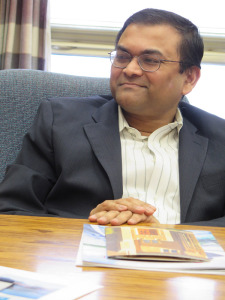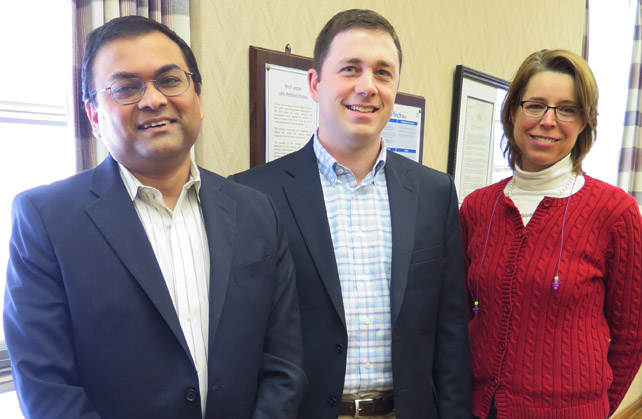By Mark Frost, Chronicle Editor
For the first year-and-a-half that he headed Glens Falls’s Finch Paper, India-born Debabrata (Deba) Mukherjee, Ph. D., steered clear of the media.
This week he opened up — meeting separately with several newspapers. The Chronicle’s turn came on Monday at 11 a.m.
“What have I been doing the last 18 months? We have done what Finch has never done before. We added a huge number of new customers, a significant number of new products, we achieved the highest production in our history, the lowest claims in our history, announced a program to modernize our woodyard and our other facilities, acquired the [Saratoga County] landfill, started increasing both the revenues as well as employment, and we have improved our earnings every quarter since I took over in Q2 of 2013.

“Along with that, we have increased the talent pool, changed our management team, greatly improved our sales force and positioned the company for a lower cost structure in the future, and vastly improved operating sustainability for the long term.
“We didn’t say a lot but we did a lot. My biggest job is to ensure Finch is sustainable, profitable, thriving and growing for the long term, and 18 months later, that is what we did. That’s an important achievement that I set out to do when I came.”
Mr. Mukherjee said he’s meeting with the press now, both because groundwork has been laid and there’s considerable progress to report, and because Finch is now celebrating its 150th year, which resonates not just in the mill but in the greater community, given its heritage, its 615 to 620 employees and its estimated regional impact of 3,500 jobs and $370-million, said Finch publicist John Brodt.
“Very few companies make it to 150 years. We have,” Mr. Mukherjee said. “And we wanted the 150th year to be not only a celebration of the past but a successful sustainability celebration for the future.
“We are truly an American success story. Finch has changed. And the changes have been for the better. And it has been very, very heartening to watch the team that was here, along with the team we recruited, do great things for the benefit for all of the community, all of the stakeholders.
“And for the first time, the hard work was reflected in the most improved company award we got from Atlas [Finch Paper’s now owner Atlas Holdings], as well as the huge investment in modernization that is a reflection of the confidence they have in the leadership team and the work we are doing.”
![Born in Calcutta, India, and having earned his Doctorate and Master of Science in Chemical Engineering at Rensselaer Polytechnic Institute in Troy, Finch Paper CEO Deba [pronounced debba] Mukherjee, smiles readily but stays very much on message during an interview. He needs no help in articulating his case. Incidentally he’s just 46 years old. Chronicle photo & text/Mark Frost](https://www.glensfallschronicle.com/wp-content/uploads/2015/02/Deba-smiles-IMG_1088-300x225.jpg)
Mr. Mukherjee said that Atlas has committed to a $20-million renovation that will substantially improve Finch’s woodyard operation on Pruyn’s Island, making it much more efficient and rebuild the company’s biggest papermaking machine, replacing “the headbox.”
“That machine will be reliable for a very, very long time going forward,” said Mr. Mukherjee.
That Finch Paper even thinks about being viable for a “very, very long time” is exceptional.
U.S. demand for paper, said company officials, is declining by 2 to 3 percent a year. Last year, said Mr. Mukherjee, it fell 8 percent. Yet, Finch Paper grew its sales by 4%.
“So the spread between the market and us was 12 percent. And if we were not able to do that, obviously that would have dramatic impacts,” the CEO said.
Other mills are closing. “Every year, if you look at the last 10 years or so, you would find about 350,000 to 500,000 tons of capacity taken out of the paper industry every year…” said Mr. Mukherjee.
“That has been the trajectory every year, as painful as it is, that is the reality. So Finch had to do things differently to be relevant for the next 50 years, because if you do the same things others do, you’ll get the same results others do…
“We’re not going to be a statistic. A lot of hard work, a lot of late hours, a lot of heads-down, difficult tasks, but we have done the hard work necessary to make sure we grow for the next 50 years.”
Finch says it is now North America’s sixth largest producer of uncoated free sheet paper. How much paper does it make? “Our public statements have been 260,000-ish [tons], though we have increased that,” says Mr. Mukherjee, who chooses words consciously and carefully.
What are Finch Paper’s current sales? “The last publicly stated was $280-million,” he said. “We certainly are north of that because we have had our best year of papermaking and sales and we are continuing to grow.” As a privately held company, figures don’t have to be made public.
Mr. Mukherjee says his key roles are to set strategy and assembling the Finch Paper team. He said he’s added many new people but had no layoffs and that Finch relations with its unions are strong.

The CEO goes into the mill at all hours and days. CFO Derek Basile said, “Someone told me when I was interviewing that Deba’s idea of a vacation is wearing sneakers to the mill on Saturday.”
Mr. Mukherjee also goes on the road to visit customers, more than 40 of which have been added in the past 18 months, compared to a handful in the prior five years, officials said. There’s also an emphasis on new products.
Mr. Mukherjee said he’s seeking state help not just for Finch Paper but to keep the whole wood products industry viable in northern New York. He said loggers need help with financing to replace equipment and Finch needs assurance it can obtain natural gas at internationally competitive prices.
Mr. Mukherjee lives in Wilton with his wife and their son, 15. In India he grew up an only child whose father was a civil engineer and his mother a housewife. He visited India in December and says his parents come to visit in America every year.
Copyright © 2015 Lone Oak Publishing Co., Inc. All Rights Reserved.
 Glens Falls Chronicle Serving the Glens Falls/Lake George region; Warren, Washington and northern Saratoga counties since 1980
Glens Falls Chronicle Serving the Glens Falls/Lake George region; Warren, Washington and northern Saratoga counties since 1980


